#which will be great if i do go into clinical psychology like i want to !!!
Text
are we talking about broke therapists yet?
I've been out of things for a couple of years now, which is why I'm willing to talk about it, and maybe the pandemic has helped things a little, but holy shit the counselling and psychotherapy field is not equipped to help its practitioners in the gig economy.
Of all my interests and talents, I pursued a degree in psychology because being a therapist is supposed to be a safe, stable, well-paid job. Every therapist I met who was registered before 2008 worked and lived under that assumption. And oh boy are all the fee structures--registration, supervision, continuing education, conferences--set up for that scenario.
After getting my Master's, I struggled like hell to get a job. It was especially bad because to get my license, I needed a supervisor to take me on. To take me on, most supervisors wanted me to already have a caseload and client base. To get a caseload and client base, I needed a job.
Friends: Every single job I heard back on wanted me to have my license before I could even land an interview.
Professors and career advisors and professional development specialists all advised me very earnestly to just keep cold-calling people on the supervision list, and it began to feel a lot like my parents' friends telling me to hit the bricks and hand out resumes. That's what worked for them, right?
I finally got a supervisor who agreed to take me on, and I'd be able to use her clinic for advertising and workspace, and we were doing the paperwork to send in with my registration, when she called me up and said, "Is this job going to be your only source of income? If you're trying to depend on getting clients and building your practice for your basic needs, this is not going to work out. This has to be something you're doing on top of a basic salary. Okay, so you're not working anywhere else right now? I'm sorry, I can't move forward with this."
Even once I landed a supervisor and a job building my own private practice, I struggled. I have ADHD and am not great at self-promotion, so trying to do all my own advertising, scheduling, bookkeeping, billing, and records management (on top of counselling) was an enormous strain. One my bosses, supervisors, and other senior professionals watched with a slightly critical eye, but consoled me about because in their early days, their clinics had had business managers, receptionists, filing clerks, and accountants, and getting used to doing everything online yourself was a bit of a learning curve, wasn't it?
I counted my pennies very carefully, because I had to pay my supervisor roughly $180 for their services every 6 hours of in-person counselling I did. This meant that to break even I had to charge my clients an average of about $30 (plus room rental and service fees) an hour--and my clients, being people with complex trauma, were frequently poor, disabled, unemployed, and had no health benefits, so even $10 or $20 a session was a lot for them.
Maybe it would have been easier if I could have taken some of those nice comfortable organization positions where they find clients and funding for you and you work 40 hours a week and get benefits and a pension, but I had to be disabled into the bargain, so working 40 hours a week just isn't possible for me. I start passing out from stress and exhaustion. Older colleagues gave me serious-faced advice about approaching my employer and asking them for some flexibility and accommodation in my schedule, and I tried to explain across the gap between us that employers simply did not hire me if I made the slightest noise about the workload. They weren't going to invest in me as a person; they were hiring 40 units of work a week, and if I wouldn't do it there were a dozen applicants after me who would.
At one point I broke down enough to email my licensing body because the Annual General Meeting/Professional Development Conference was coming up, and I wanted to attend, but I could not produce $500 to do it with. Was there some kind of way I could attend anyway? I felt ashamed to have to ask, and then absolutely mortified when the response came from the organization president, who needed to personally sign off on me being too poor to attend the single most important event in my profession's calendar year.
I honestly felt so ashamed all the time at how I was apparently failing to be a successful therapist, failing to be rich and successful, and every time I mentioned it around mentors and bosses, I could feel myself shrinking from a person to a problem to be solved. My closest therapist-friends and I have reflected on how much more difficult, poorly-paid and underworked, our various career starts have been than we were ever warned about. About the classmates and coworkers who couldn't get disability exceptions when they fell behind in their registration requirements, or burned out and left the field, or dropped their registrations and took up as life coaches, or moved their whole family somewhere exceptionally remote or rural because it was the only good job available, or worked for some godforsaken app skirting the bounds of malpractice like BetterHelp.
I like those conversations, because I feel less like an absolute fuck-up in them. There's less "Hey Lis, you were so talented in grad school, I really admired you, what are you doing now?" "Oh, I, uh... am professionally disabled, so I get government benefits, and I... sell embroidery patterns on Etsy now."
My own therapist kept asking if and when I felt like going back to being a counsellor, and I finally told him: I don't, actually. I don't want to go back and do it like I was doing it before. It was a profession I loved to the depths of my soul, and it profoundly did not love me back. I can't even imagine what would have to change, in me or it, to make it have a space in it that could fit me.
All of which I was way too scared to admit to at the time, because the more I let people know I was struggling, the more they hinted that maybe I just wasn't in a place in my life where this was a job I could do, and I needed to take a little break and wait to come back until money and disability just weren't issues for me anymore.
Eventually my cups of doubt and exhaustion did overflow, and I quit. I'm here now, living a much different life. And at the very least, all my years of helping people in bad life situations set me up perfectly for my own. I already knew what form to fill out for financial assistance, which student clinics to access for mental health support, and which government agency would, if pressed, cough out pharmacy coverage for the genuinely destitute. It gave me that much.
I hope this is just me being in extraordinary circumstances, sitting at the intersections of a few different shitty life situations that most people skip right past. Because it's on one level comforting, but another deeply infuriating, if I'm not, and I've just missed it or we've just all been too afraid to admit it to each other.
601 notes
·
View notes
Note
serious question but do you personally believe there is a way to approach psychiatry in a way that uplifts and upholds patient autonomy and wellness or is the entire trade essentially fucked haha. Btw this is an ask coming from a 3rd year med student—with a background of severe mental illness—who is considering a residency in psychiatry after receiving life-saving care in high school pertaining to said conditions. (I have peers who have been involuntarily hospitalized and treated horribly in psych wards, with approaches i patently disagree with, but was lucky not to experience. I don’t like modern american medicine’s approach to mental illness; “throw pills” at it to “make it go away” ie. a problem of overprescribing, inadequate and non-holistic approach to mental health, and i feel a lot of that can be attributed to the capitalistic framework. I also def agree with you that so much of what can be considered normal human responses to traumatic events/normal human suffering can be unnecessarily pathologized—a great example being the whole “chemical imbalances in the brain is the ONLY reason why im like this” argument that ive unfortunately fallen hard for when i was younger and am still currently dismantling within myself…and like dont even get me started on this field’s history of demonizing POC, women, LGBT, etc). Like i deeply love my psych rotations so far, and i utterly feel in my gut that this is the manner in which i would like to help people—a lot of whom are just like me—but im wondering if there is a way to reconcile these aspects in a way that one can feel morally okay participating within such an imperfect system, in ur opinion… ngghhhhhh i just want to be a good doctor to my patients…
(ps i love all ur writing and analysis on succession!! big fan mwah <333)
i don't mean to sound unduly pissy at you, specifically, but i do have to say: every single time i've talked about antipsych or broader criticism of medicine on this website, i immediately get a wave of responses like this, from doctors/nurses/psychs/students of the above, asking me to, like, reassure them that they're not doing something immoral or un-communist or whatever by having or pursuing these jobs. and it's honestly frustrating. why is it that these conversations get re-framed around this particular line of inquiry and medical ego-soothing? why is it that when i say "the medical encounter is not structured to protect patient autonomy or well-being," so many people hear something more along the lines of "doctors are mean and i wish they were nicer"? why is it that it's impossible to discuss the philosophical and structural violence of academic and clinical medicine without it becoming a referendum on the individual morality of doctors?
i'm choosing to read you in good faith because i think it's possible to re-re-frame this line of questioning to demonstrate to you the sorts of critiques and inquiries i find more interesting and more conducive to patient autonomy and liberation. so, let me pick apart a few lines of this ask.
"is the entire trade essentially fucked?"
if you're thinking of trying to 'reform' the project of medical psychology within existing infrastructures and institutions, then yeah, it's fucked. if you're still assuming that affective distress can only be 'treated' within this medical apparatus (despite, again, no psychiatric dx satisfying any pathologist's understanding of a 'disease' ie an aberration from 'normal' physiological functioning) then you're not challenging the things that actually make psychiatry violent. you're simply fantasising about making the violence nicer.
"I don’t like modern american medicine’s approach to mental illness; “throw pills” at it to “make it go away” ie. a problem of overprescribing, inadequate and non-holistic approach to mental health, and i feel a lot of that can be attributed to the capitalistic framework."
i hate when i talk about psychotropic drugs being marketed to patients using lies like the chemical imbalance myth, and then pushed on patients—including through outright force—by psychiatrists, and the discussion gets re-framed as one about 'overprescribing'. my problem is not with people taking drugs. i am, in fact, so pro-drugs that i think even the ones administered in a clinical setting sometimes have value. my issue is with, again, the provision of misleading or outright false information, the use of force and coercion to put patients on such drugs in order to force social conformity and employability, and the general model of medicine and medical psychology that assumes patients ought to be passive recipients of medical enlightenment rather than active participants in their own treatment who are given the agency to decide when and how to engage with any form of curative or meliorative intervention.
'holistic' medicine and psychiatry do not solve this problem! they are not a paradigm shift because they continue to locate expertise and epistemological authority with the credentialed physician, and to position patients as too sick, stupid, or helpless to do anything but receive and comply with the medical interventions. there are certainly psychotropic drugs that are demonstrably more harmful than others (antipsychotics, for example), and some that are demonstrably prescribed to patients who do not benefit from them and are even harmed by them. conversely, there are certainly forms of intervention besides pharmaceuticals that people may find helpful. but my general critique here is aimed less at haggling over specific methods of intervention, and more at the ideological and philosophical tenets of medicine that cause any interventions to be imposed by force or coercion on patients, then framed as being 'for their own good'. were suffering people given the information and autonomy to actually choose whether and how to engage in any kind of intervention, some might still choose drugs! my position here is not one of moralising drugs, but making the act of taking them one that is freely chosen and available as an option without relying on physician determination of a patient's interests over their own assessment of their needs and wants.
"so much of what can be considered normal human responses to traumatic events/normal human suffering can be unnecessarily pathologized"
true, but don't misunderstand me as saying that drugs or any other form of intervention should be forcibly withheld from those who do want them and are made fully aware of what risks and harms seeking them could entail. again, this would still be an authoritarian model; my critique is aimed at increasing patient autonomy, not at creating equally authoritarian and empowered doctors who just have slightly different treatment philosophies.
"dont even get me started on this field’s history of demonizing POC, women, LGBT, etc"
ok, framing this as "demonisation" tells me that you're not understanding that, again, this is a systemic and structural critique. it is certainly true that a great many doctors currently are, and have historically have been, outright racist, trans/misogynist, ableist, and so on. framing this as a problem of a well-intentioned discipline being corrupted by some assholes is getting it backwards. medicine attracts prejudiced people, not to mention strengthens and promotes these prejudices in its entire training and practice infrastructures, because of its underlying philosophical orientation toward enforcing 'normality' as defined by 18th-century statistics and 19th-century human sciences that explicitly place white, cis, able-bodied european men as the normal ideal that everyone else is inferior to or failing to live up to. doctors who really nicely tell you that you're too fat are still using bmi charts that come from the statistical anthropometry of adolphe quételet and the flawed actuarial calculations of metlife insurance. doctors who really nicely deny you access to transition surgery are still operating under a paradigm that gives the practitioner authority over expressions and embodiments of gender. the issue isn't 'demonisation', it's that medicine and psychiatry explicitly attempt to render judgments about who and what is 'normal' and therefore socially 'healthy', and enforce those standards on patients. this is not a promotion of patient well-being, but of social conformity.
"i deeply love my psych rotations so far, and i utterly feel in my gut that this is the manner in which i would like to help people"
let me ask you a few questions. you say that you like your psych rotations... but how do your patients feel about them? is their autonomy protected? are they in treatment by free choice, and free to leave any time they wish? are they treated as human beings with full self-determination? if you witnessed a situation in which a patient was coerced or forced into a certain treatment, or in which you were not sure whether they were consenting with full knowledge or freedom, would you feel empowered to intervene? or would doing so threaten your career by exposing you to anger and retaliation from your higher-ups? what higher-ups will you be exposed to as a resident, and then as a practicing physician? could you practice in a way that committed fully, 100%, to patient autonomy if you were working at someone else's practice, or in a hospital or clinic? could you, according to current medical guidelines, even if you had your own practice?
when you say "this is the manner in which i would like to help people", what do you mean by "this"? can you define your philosophy of treatment, and the relationship and power dynamic you want to have with any future patients? is it one in which you hold authority over them and see yourself as determining what's in their 'best interests', even over their own expressed wishes? have you connected with patient advocates, psych survivors (other than your friends), and radical psychiatrists and anti-psychiatrists who may espouse heterodox treatment philosophies that you could consider? do you think such philosophies are sufficient for protecting patient autonomy and well-being, or are they still models that position the physician's judgment and authority over that of the patient?
"im wondering if there is a way to reconcile these aspects in a way that one can feel morally okay participating within such an imperfect system"
and here is the crux of the problem with this entire ask. you are wondering how to sleep at night, if you are participating in a career you find morally distasteful. where, though, do your patients enter into that equation? do you worry about how they sleep at night, after having interacted with a system of social violence that may very well have traumatised them under the guise of providing help? why does your own guilty conscience worry you more than violations of your patients' bodies, minds, and basic self-determination?
i can't tell you whether your career path is morally acceptable to you. i don't think this type of guilt or self-flagellation is fruitful and i don't think it helps protect patients. i don't, frankly, have a handy roadmap sitting around for creating a new system of medicine and health care that rests on patient autonomy. affective distress is real, and is not something we should have to bear alone or with the risk of having violence inflicted upon us. what you need to ask yourself is: how does the medical model and establishment serve people experiencing such distress? how does it perpetuate violence against them? and how do you see yourself countering, or perpetuating, such violence as someone operating within this discipline? what would it mean to be a 'good' actor within a violent system, if you do indeed believe that such a thing is ontologically possible?
716 notes
·
View notes
Note
Hey there! I work as a therapist and a few of us were starting to think of the clinical applications of chronivac. We were wondering if you wanted to work together to develop some presets that our clients could use to de-stress and take a break from their stressful lives. I know we have one stressed out university student who could benefit from something like this.
At Chronivac, we are always interested in collaborating with research institutions. After all, Chronivac is not used just to have fun. It is already being used for the treatment of various physical illnesses and also for resocialization projects. The use in the psychotherapeutic field would be new, but sounds interesting according to the research and development department. If the student they are talking about is available as a guinea pig, perhaps send us a requirements profile for a transformation. And we'll see what we can do….
Research Diary Timothy Walker
Day One: My psychotherapist tells me that my burn-out syndrome has progressed to the point that continuing my business studies is out of the question at this point. In fact, I am having a hard time concentrating. Writing this report is causing me great difficulty; my attention span is only a few minutes. Therefore, an experimental therapy has been decided with the psychology faculty, which is connected with a semester off for me. Under certain circumstances, the semester can be counted as an internship. Everything is fine with me. I am just tired. The work on the research diary was exhausting for me. I need to lie down.
Second day: I slept very well. No wild nightmares as usual. I woke up briefly once or twice at most, but went right back to sleep. Michael, who is in charge of the project as pysiotherapist, thinks that this would be a good starting point to work on my physical fitness. We both went running for an hour. I'm exhausted, I haven't moved that much since I started studying. But I feel good. Made myself a real breakfast for the first time in months according to my new nutrition plan. I'm supposed to spend the rest of the day walking on the beach. Let's see if that clears my head.
Third day: Before Michael came for the training session, I was already in the gym for an hour. I'm really enjoying the physical activity. The beach walk yesterday was great. And Michael was thrilled to see the progress I'm making in terms of fitness. Had the first session with my creativity coach today. Seems a little silly to me. But imagining what I would be doing if I weren't studying business was fun. But I have to admit, my head isn't really getting creative yet. At least writing the diary is already much easier for me.
Day four: I need new challenges. The beach run with Mike is fun, but it's not a sport. That's warming up. We discussed that I would go running alone for an hour tomorrow and that we would meet in the gym of the therapy center. I'm supposed to come without a T-shirt. Mike wants me to learn to love my body. To be honest, I already do. I've already jerked off twice today. And think about sex a lot more than usual. Mike also comes in the process. My creative trainer is also quite cute, but he's too skinny for me. I like men who have a lot of muscle on them.
Fifth day: Fuck, the workout with Mike is awesome! I love the gym from the first minute. Yes, the beach feels my home. But the gym is the place that prepares me for that home. Working out shirtless makes the workout even more intense. i can't get enough of Mike's and my sweat beading on our pecs. But I'm so horny. All the time. During the creative training with Kev it just bubbled out of me today. I would so love to be a lifeguard. Maybe not all the time. But on vacation. And on the weekends. The idea made me even hornier. Poor Kev. He's not my type, but I had to nail him during practice. No idea when I last had sex. but this first time in a long time was incredibly intense. Thank God Kev felt the same way….
Day six: Today is uh free day at da therapy center. Mike n kev are already down at da beach, I wanted to pump up da muscles beforehand. I'm looking forward to da sea n da sand. Both make my head so free. Although I wouldn't feel like my head wuz overly full right now anyway. Pumping, fucking, jogging n swimming. That's really all I'm thinking about right now. Kevin says that I certainly wouldn't have to worry about da practical entrance exams for lifeguards. But I shouldn't underestimate da theory. Shit, studying sucks. But I guess it haz to be.
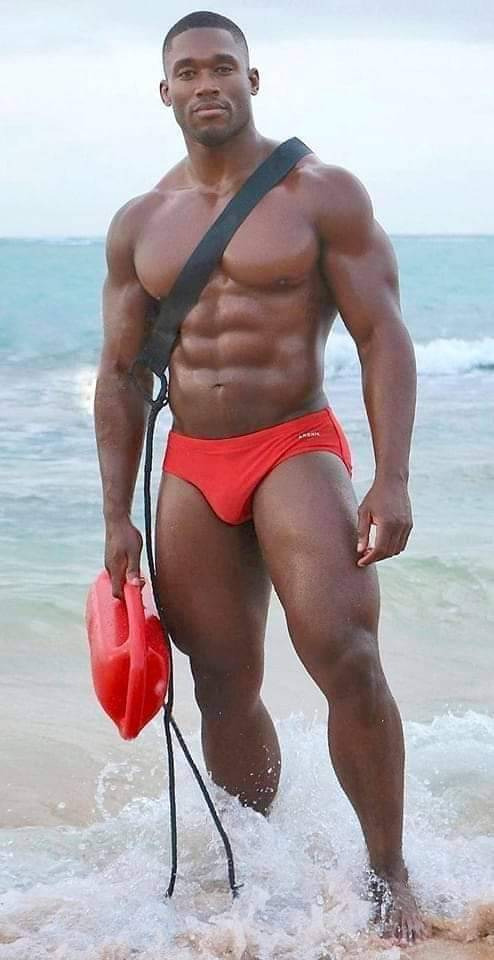
Day seven: I like it when I have da early shift. Da routine of opening da station is relaxing, da beach is still quiet, da few guests are usually relaxed n in uh gud mood. Wuz one of da best ideas of my life to take uh semester off n work as uh lifeguard. My pal mikey told me to lay off this crappy journal. Somehow I thought it wuz important until now. I can't remember why, either. Anyway. Da main thing is that da surf is gud. Den you can have some fun with da surfers afta work. Hehehehe…
132 notes
·
View notes
Text
2. The Footprint of a Giant
I've said before that Sunda Systems was a global company, but I don't think even I understood the scale of the investigation I was undertaking. The first thing I needed to do was get a sense of the scope. To do that I needed to understand the corporate layout.
To start, Sunda is an umbrella company that has quietly (and not so quietly) purchased a lot of technological companies.

Sunda Systems had complete ownership or majority stake in things I'd never imagined.
Some things I would have anticipated. For example, in 2021, they purchased the internet radio company Re:Mx and they had controlling interest in a broadcasting technologies company called Ressepont. For a corporation focused on wireless connectivity, these things made sense to me.
Engineering and satellite companies? Sure. Even the three laser research companies kind of made sense. I could talk myself into the idea of using lasers for fiber optics.
But then there was the medical research. They outright owned Brainwire, a tech start up that wanted to create a human-computer interface. They also owned Lotus Clinical Research and it's subsidiaries.
What on Earth would that have been for? A sideways purchase in the name of portfolio diversification?
It got stranger when I found court documents of Lotus trying to fend off a hostile takeover. Brainwire seems to have gone smoothly. If you started tiny company in your back shed and a giant like Sunda approached you with a truck of money, you're not going to turn it down. But Lotus appeared to be functioning well on its own and the CEO, James Pepper, did not want to sell.
Until he suddenly did.

Hundreds of documents and depositions were attached as exhibits to this Order.
When Mr. Pepper first files his injunction to stop Sunda from buying Lotus, it was because the swing vote on the board, John Delphine, began behaving strangely. Here is testimony from his initial October 1, 2008 filing:
It appears that John has lost his mind. Years we spent building this company from the ground up. We wrote protocols together late into the nights. We found medical equipment anywhere we could. We found doctors willing to work with a couple of scrappy upstarts. And god damnit we did it. We made this company profitable. And now?
Sunda Systems waves a couple dollars at him and he's ready to sign the company over? No. No chance in hell. No amount of money is worth the work we put in here, and he knows it. I don't believe he's in his right mind, and I would like him assessed by a professional.
It had to be some kind of nervous break or an addiction or something! There is no other reason he would come into my office in the state he was in. Talking so fast about the wonderful multinational conglomerate that wants to buy us out. I was only catching every three words. He was maddened! That wasn't the John I knew.
Mr. Pepper fought tooth and nail against the sale of his company by his partner. The suit lasted three months. Mr. Delphine never got his psychological evaluation. Instead, Mr. Pepper simply gave up the fight. This is a retraction that Mr. Pepper gave on December 21, 2008, leading to the closing of the case:
I now see what John saw back in October, and I apologize for thinking what I thought about him. I'm still worried about the zeal with which he approached me, but the points he made were valid ones. Ego kept me from seeing the truth.
It is my wish to retract my claim of mental incapacity and move forward with the sale to Sunda Systems and I am very excited to work with them in a subordinate position so that I can continue to shepherd out company to greatness.
The recorder who took Mr. Pepper's retraction noted in the filing that the man appeared tired and defeated with red eyes.
Mr. Pepper and Mr. Delphine are now high ranking executives in Sunda's Clinical Research Division, and both have offices in the Eden Springs Campus.
I reached out to them, posing as a reporter following up on the sale years later. I asked if they'd had any regrets selling Lotus to Sunda. Oddly, they both answered the exact same way, verbatim:
"It is a wonderful opportunity to work for such a forward thinking company. I wouldn't leave it for anything."
It sounded obviously rehearsed; even more so after I heard it the second time.
During my call with the men, the webcam light on my laptop came on again, only turning back off after I had hung up. That seemed far too much of a coincidence. I don't want to believe that someone in the company is keeping tabs on me, but a company dedicated to the internet has to have someone who can hack a webcam.
I'm proceeding with the assumption that I'm being monitored. I wondered if I should try to get a new router, but every time I think about it, it seems so overwhelming. My provider uses Sunda equipment exclusively so I'd have to find a new provider and cancel my service and it just all seems too much. I'll just keep it. What harm could it really be doing?
The last piece of information I found today was an old classified add for the home of the Delphine family. They listed their Eden Springs home in early 2009 and it sold for $349,000. Quite the windfall for that era of history.
Out of curiosity, I looked up John Delphine in the Avery County Tax Assessment records and found he and his wife's new address.

They live on-site at the Eden Springs Campus in an apparent outbuilding on the same property as the offices.
Perhaps it's time for a visit to North Carolina so I can get a real look at Maple Hall.
17 notes
·
View notes
Text
First Pants, THEN Your Shoes
I spent a lot of time on the autism and ADHD subs before and in the aftermath of my ADHD diagnosis, and it was often helpful in contextualizing a lot of my nagging and seemingly unexplainable problems. The people there are generally nice, I never really saw any of the toxic behavior that Reddit is famous for. There's just one incident that stuck in my craw, where someone was dealing with issues of emotional access that I thought were so misunderstood by everyone who responded, I wanted to help somehow but I didn't know what to say.
Basically this person admitted that they just have no relationship with their parents. For their whole life they never experienced an authentic, loving connection, and faking it all the time was both exhausting and guilt-inducing. This was a pretty brave thing to express, but I thought that it basically made sense in a forum for people who are famously thought of as cold, rude, and "low empathy". But what happened was that a ton of people responded with "I feel this because" of their horrific history of open abuse and neglect, which I thought was clearly not what OP was describing--and then one person absolutely flipped the fuck out on them, posting a vicious tirade about what a bad person they were. The aggressor faught with a couple of other people before loudly announcing that this post had caused them to leave that subreddit for good. That seemed so cruel and unnecessarily personal to me, I really felt bad for OP who came to the autism forum like we all do to say "I have feelings or behaviors that are abnormal and I feel bad/confused/conflicted about them." I also felt bad that their confession had been conflated with the problems of child abuse and domestic violence, which they clearly did not address. I thought I knew what they meant. I think that I also have different kinds of emotional experiences than most people, and that incident reminded me of why I don't usually admit it.
Do I have histories of abuse and neglect that could have affected my emotional development, or am I just "like this"? I don't know how to answer that. I think that the nature versus nurture debate is like, a fun game to play, but basically absurd. There is absolutely no way to control for pure effects of biology and neurology and genes, separate of pure effects of experience. The right answer is always "it's both", and then you proceed with whatever psychological management style seems most helpful. You try to understand what you have to work with, which rarely involves nailing down the absolute factually objective specifics of your origin story; you approximate about what feels important, and you try to move forward. Some people have histories so difficult that dealing with their inherent "nature" is moot, and some people have a nature that makes even minor experiences vastly more affecting than usual.
To be Freudian about it, my mother kind of didn't want anything to do with me. She was civil about it so it's hard to say I was abused, but I received a pretty consistent rejection signal until she died when I was a teenager. This seems to me to be related to her mother, who made a big performance of being the Perfect Mommy but who was in fact critical, controlling, and manipulative. This in turn seems related to the fact that her father, my great grandfather was a child rapist, which my grandmother refused to deal with, or only dealt with through her burlesque of extreme normality. Severe clinical depression exists on that side of the family, and I have it too. Nature or nurture?
My paternal grandfather was a fascinating, cosmically-minded person who obviously affected my father's powerful intellectual development, but who was emotionally absent. My paternal grandmother was an infantile narcissist with zero sympathy for others and semi-violent tendencies. Also there was obviously "something going on" with her; she cataloged everything in her house, literally on a computer and in physical binders, and devised wild methods of controlling everything around her including children and animals. When we visited her we had to shower outdoors like cattle.
In my family, we didn't say I love you. We didn't touch except for ritually mandated occasions. But we talked a lot. We shared interests, which many families do not do, do not even consider, even when they are warm and affectionate. From the moment I was born I was sad, angry, obsessive, freaked out. Intellectually overdeveloped and emotionally crippled. My mom checked out, and when her parents visited I was very confused and frightened by their soap operatic and purpose-driven performance of emotion. But no matter how messed up I was, my dad made infinite amounts of time for me. I cannot say that he was comforting the way people normally mean it, but he was present and listened. How many miles did we walk before I was a teenager? We talked about dreams, phobias, the subconscious, symbolism, theology, and art and literature. This is still the basis on which I relate to him. Sometimes as an adult I bare a wound brazenly to see if I can make him react to the bad things that have happened to me, but he doesn't. That's not in the rulebook. I don't even know if I WANT the rules to change, I just have to test them sometimes. I probably like them just the way they are.
Meanwhile my brother, who is close in age to me, has become the single most normal and successful person I know, professionally, socially, and in his private life. Nature or nurture?
I have had a much harder time gaining traction. It's hard to get ahead when you have to spend a lot of time just figuring out what the fuck is wrong with you. There are a lot of normal-seeming things I cannot figure out or literally cannot do. My emotional life is somewhat bizarre. I either retreat from society or develop intense, virtually monogamous 1-1 friendships with very poor boundaries. At my small wedding I suddenly realized that my guests didn't even know each other very well; people making toasts didn't seem to know what to say about our courtship. I obsess over people, but it tends to be very intellectual. I don't want anyone to touch me ever, like unless we're fucking, which is a source of much confusion and ridicule among others. I need to be alone A LOT. I can think about someone all the time but forget to tell them more than a few times a year, so I have to be consciously careful to let people know I remember their existence. I once tried to explain to someone that I don't really miss people in the way that others seem to, and I meant it to say "I love you even if it doesn't look normal," and I think I just insulted the person and I regretted speaking.
I think this stuff sounds evil to a lot of people. I tend to think, there's me and there's the mammals. The mammals are warm and enjoy each other's warmth. The mammals feel safe in groups. The mammals have a physical and mental metabolism that refreshes itself daily or hourly; mine is very slow and I need lots of rest and recovery time. I don't feel safe in groups. I like to be cool and dry and hidden in the dark under a rock. For the mammals, their warmth is what makes them feel the value of life. Many of them assume that my coolness means I don't value life. This is absurd. Just because I don't want to feel your body against mine, doesn't mean I don't care what happens to your body. Just because I need to be alone, doesn't mean I wouldn't feel terrible if you are lonely or hurt. I don't even have to like you, to care whether you suffer. If I have misunderstood how my behavior will affect you, it is because I am an alien from outer space; I still care tremendously about whether I make your life better or worse. But this is hard to communicate for some reason.
I watch Lifetime movies with great, almost ghoulish fascination. I'm captivated by their hyperbole of American values, of love and family. I'm spying on it from orbit. It constantly amazes me.
I had been talking to my dad for a while about my feeling that I'm autistic, but the ADHD diagnosis took me by surprised. When I learned more about it, it explained so much about my childhood, about behaviors I couldn't help and stuff I couldn't learn that made my parents, especially my mom so, so mad at me. I didn't know how the new information would strike my dad. My doctor had cautioned me not to feel bad about all the time and potential I lost not understanding my own care and upkeep. Would my dad feel bad about not understanding me? His response was so perfectly, absolutely emblematic of our entire relationship that I couldn't have written it better myself.

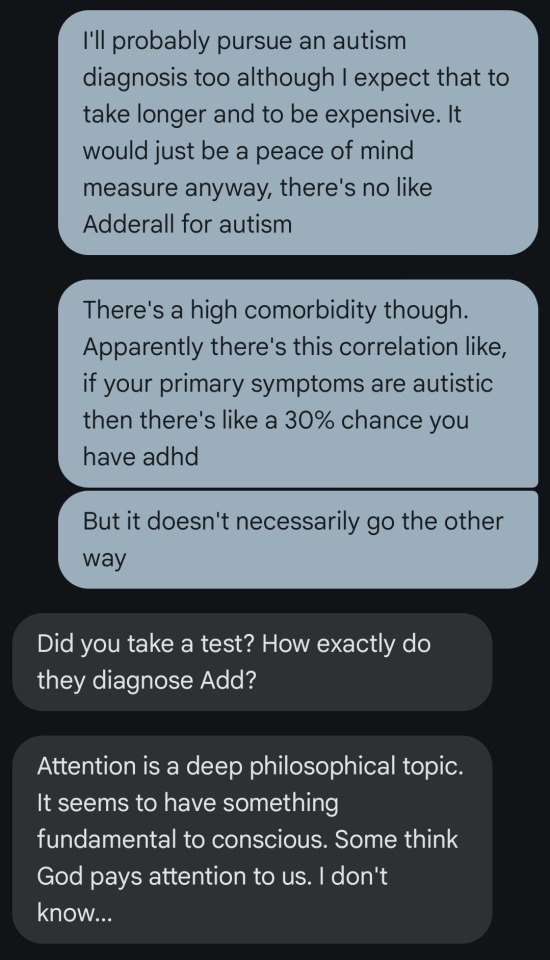
There would be no emotional outbursts, no drippy apologies. There was only consciousness, perception, existentialism, God, subjectivity versus cosmic reality. This is what we do. This is how we survive. This is how we say I Love You. I love you so much, dad. I'm proud of you and I'm so glad I am your daughter. Thank you for everything. Please don't touch me.
20 notes
·
View notes
Text
Perception bias, round 2
Director's cut, Saigenos edition!
(or basically, how my brain jumps into another topic only loosely related to the original ask)
Thank you @itsmaferart For the wonderful ask again. :)
Warning: Long post ahead
-*-
Perception bias also serves another more...sinister purpose for Saitama. Psychological conditioning. There is potential evidence for deprivation of basic needs, conditioning for violence for protection and subliminal messages for suggestion, among other things.
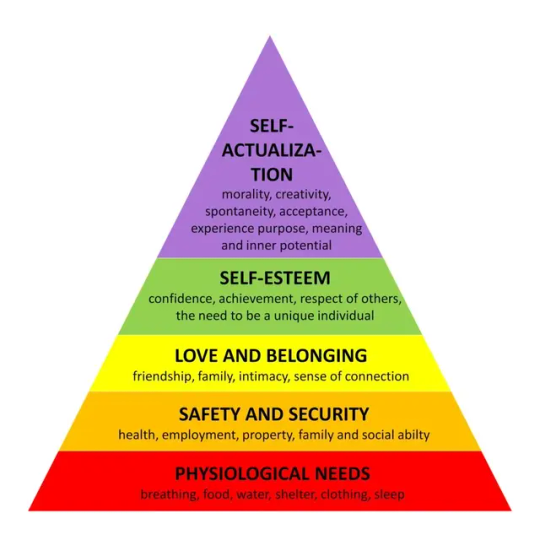
Being deprived of all these needs is akin to mental torture. But so is facing all of the underlying issues at once via hypnotherapy and cognitive behavioural therapy if the patient is sufficiently dysfunctional in a societal setting like Saitama happens to be. Especially if the therapies are performed...poorly.
CBT has shown to be the most effective intervention for people exposed to adverse childhood experiences in the form of abuse or neglect
Criticism of CBT sometimes focuses on implementations (such as the UK which may result initially in low quality therapy being offered by poorly trained practitioners. However, evidence supports the effectiveness of CBT for anxiety and depression.
Evidence suggests that the addition of hypnotherapy as an adjunct to CBT improves treatment efficacy for a variety of clinical issues.
Post Traumatic Stress Disorder (PTSD) and its symptoms have been shown to improve due to implementation of hypnotherapy, in both long and short term. As research continues, hypnotherapy is being more openly considered as an effective intervention for those with PTSD.
In short, in order to heal mentally, Saitama may need to face mental torture because he has such strong willpower and such strong mental barriers shielding his vulnerabilities on a basic primal need. There only needs to be a sufficient trigger.
ONE sent Saitama home to restore his energy levels...because he's going to sorely need them for the upcoming confrontation.
Empty Void's ability to genjutsu people casually and cause parallel shifts in the reality and using these to abuse emotional dependencies is like a loaded Chekov's gun on Saitama's forehead. Because Saitama has been roleplaying to re-learn his emphatic skillset after he had suffered too much mental trauma.
That's why early Saitama did not even bat an eye when Beefcake killed his own brother but now he's empathizing with Hamukichi. That's what I call character progression.
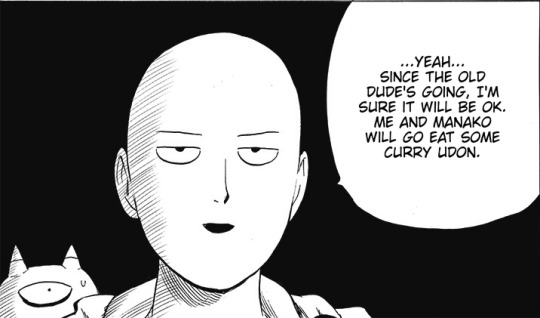
Even a compulsive planner like Saitama cannot predict what will happen because he's not familiar with Blast's maladaptive coping methods deep down. Blast is great at masking because they are coping methods so he can bear with his guilt and other issues and just wants to do things on his own, without assistance.
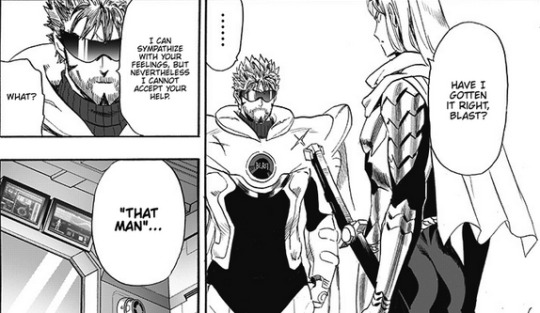
This causes Saitama's perception bias about Blast who seems capable and emphatic, when he is in actuality unscrupulous and amorally indifferent if you really, REALLY study him hard enough.
My bro casually invited Saitama, who is sensitive to aggression, hostility and violence, to watch literal torture of human turned monsters, with an actual smile on his face. And justifying it with his end justify the means philosophy. That's awfully too close to being sadistic and cruel when you consider the ramifications.
They say "love is blind" and Saitama is wearing some rose tinted glasses on because Blast is straight up shady, but he does not see it because he's probably identifying with Blast so hard. Middle-aged, number 1# hero, powerful, confident, outwardly caring, intuitive, ruggedly handsome, positively masculine, secretly gay...you name it. Everything Saitama more than likely fantasies about being because he's so emotionally dependant on Genos and he wants to better himself for Genos due to all his insecurities.
Oh yeah time for some saigenos. *rubs hands*
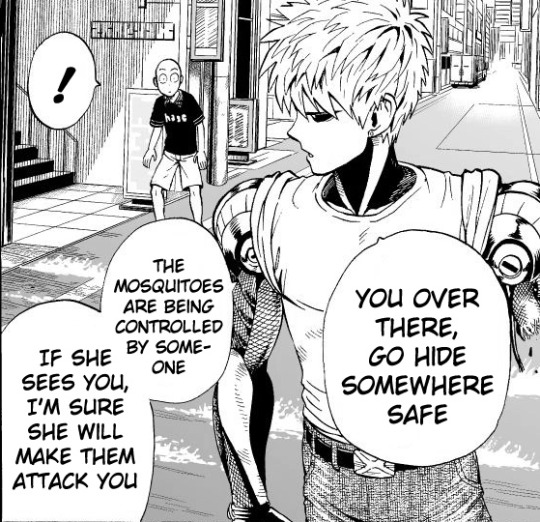
The very first Genos tells him is to tell Saitama to hide in order to protect him. Saitama has a lot of dependency issues since he has been a small child because he was so emotionally lonely and never got the safety he needed to cope well in life. There are definitely some underlying anxieties or disorders laying about.
Second thing Genos does is show just how smart, capable, cool and devilishly attractive he can be when he gets passionate and engages in combat. Genos can get an awed reaction even from Saitama who's emotions were being blunted during their first spar.
Third is showing he's not gonna judge Saitama for completely embarassing himself, even if he was to get naked around him and lower his inhibitions and showing him it would be ok to trust him on the level of intimacy he craves so dearly. (Season 2 Blu-ray & Dvd: Saitama and the mysterious heroine)
Fourth is showing that Genos is also extremely resilient even when getting hurt...because Saitama hates to see others hurting and he doesn't want it to happen because of him.
And finally the fifth...is because Genos is just as emotionally lonely as he is, but he's unable to let go of his emotional dependencies because he trauma bonds so deeply. He would rather double KO for a Game Over screen than let the monsters win over him and his loved ones on pure principle and take those he trauma bonds with him, because emotional abandonment and guilt would kill him deep inside, so he would rather end it himself for a shred of agency before he withers away.
All these draw in Saitama like moth to a flame and he easily lets Genos into his life. Because he identifies with the lonely teenage boy Genos with traumas who is so familiar to him like coming home.
-*-
Despite everything that has happened to Saitama, he tries to remain optimistic. He's not naturally prone to cynicism unless under great amount of duress. The worst thing to do against him would be Genos emotionally betraying him, betray everything that he perceived in him since the first day they met.
But Saitama has perception bias towards Genos too...such as that Genos is no longer the small teenage boy who needs to be sheltered and cared for, but a battle-hardened soldier. Neither is he a lost naive little sibling in need of guidance or chaperone but an adult wanting mentorship where he can be truly open about his own issues. Would be such a shame if these wrong illusions about Genos were to be shattered...painfully. If Genos were to ever violate that implicit trust Saitama gives to him.
My brother in christ Saitama, he's not actually related to you and he's not your family member even if you'd love him enough to adopt him or something. Not letting go of this notion will spell trouble, like wonky image of relationships and intimacy.
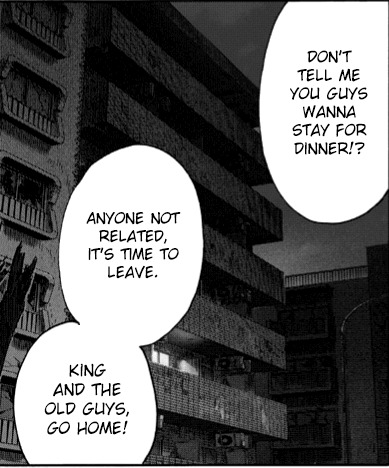
(Yea Saitama please he's not actually related to you, even if it's kind of endearing that Saitama considers Genos to be as close like a family member)
It'll just get worse if Saitama confuses emotional intimacy with sexuality because of his bad upbringing when he's never had any friends and missing his parents too and all his role models have been aggressive and toxic people.
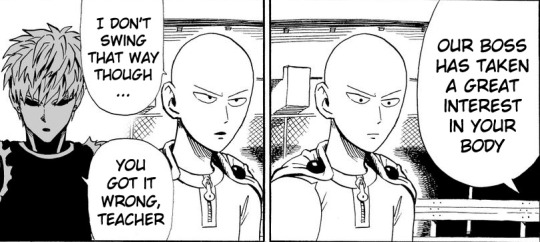
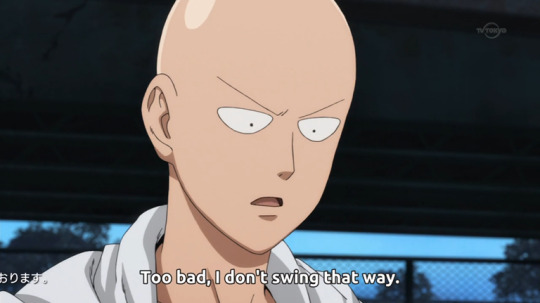
Funny how Saitama's first conclusion about Dr. Genus being interested in his body was sexual in nature and he immediately got defensive. He essentially revealed himself as someone who doesn't even know for sure which way he swings. Which would be quite classic for infj demi but I'll get to that if it becomes more relevant.
Genos naturally knows best though, poor guy looks so disappointed haha. Doesn't stop Genos from attempting every trick in the book besides outright throwing roses at Saitama and arranging dates to get into his good side and woo him, he dressed up so nicely for a spar haha. Dressing to impress, yup. And then he got himself new shiny body and practically walked weeks without a shirt on just so Saitama would see it. (Chapter 185: Updates) My guy has it down bad for Saitama, but Saitama seems oblivious to Genos indirect advances and Genos gave up and finally found a shirt to put on.
(I would pay to see Genos actually chuck roses at Saitama though.)
Even Saitama has to acknowledge that Genos is objectively a hottie though, because in the webcomic he says something along the lines of "he's not even pretty" about Amai-mask and it really makes you think the standards of who Saitama considers pretty when even ikemen like Amai-mask won't do.
-*-
Genos unfortunately is growing up some pretty large perception bias about Saitama after the time travel fiasco. His idolization of Saitama is becoming obsessive and objectifying, like Saitama can do no wrong and that Saitama is some kind of messiah.
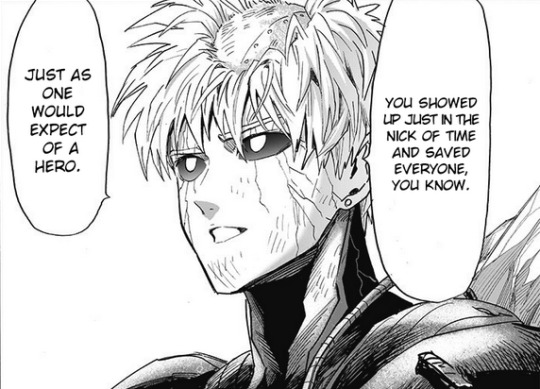
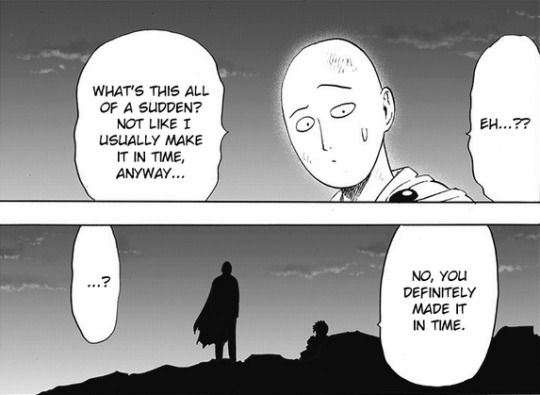
Genos also does not take no for an answer. It would be incredibly damaging to both Saitama and Genos when this perception bias is broken when Saitama gets too much on his plate to handle. Like for example...Empty void's specialty, messing with emotional bonds and inducing traumatic events like the illusion of death to break any emotional bond, just like he did to Flashy flash and Sonic.
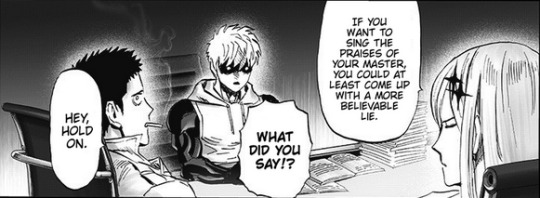
I do greatly anticipate how Empty Void's fight is going to proceed, we might be in for very big perceptional bias shifts all around, like Flash was forced to acknowledge that he's emotionally dependant on Sonic. (Chapter 201: You pass) And Saitama's idolization of Blast will come crashing down when he finds out what Blast is really up to.
I'll throw some funny perception bias at the end.
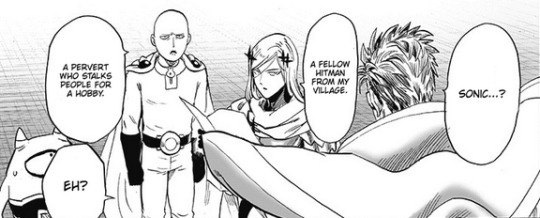
#opm#one punch man#saitama#genos#opm meta#saigenos#genosai#saitama x genos#perception bias#opm blast#empty void#flashy flash#emotional intimacy#long post
8 notes
·
View notes
Text
couldn’t stop thinking about this, so here’s a followup :)
When Eddie does eventually get a tattoo for Steve, it’s on a whim.
Kind of on a whim.
He hadn’t forgotten about the idea by any means, but he had yet to come up with an idea that came even close to encapsulating the love Eddie had for Steve, so he waited.
Then, one day, around a year and a half after their initial conversation on the subject and when Steve and Eddie were enjoying a lazy morning arguing over the grocery list (Steve wants to try a new pasta salad recipe, the fancy bastard, and Eddie just wants him to make the same cheesy marinara pasta sauce he’s been fiending over for years), Steve gets called into the hospital.
His second-to-last clinical rotation for his psychology doctorate sent him to the psych floor of a nearby emergency room, which has meant, for the first time, Steve is on-call even when he’s not scheduled to be at the hospital.
Steve is miserable — the most miserable Eddie’s ever seen him when it comes to his psych program — and annoyed with the school for assigning it to him when there had apparently been others available that were closer to how he actually wants to use his doctorate when he finally earns it, but, like he tends to, he’s being a decent sport about it.
He’s on the phone with his C.I. affirming that he’ll be in as soon as he can when he picks up a pen, grabs Eddie’s wrist, and scribbles fresh mozzarella, penne, tomatoes, lemon juice on the underside of his forearm. Below that he writes love you, and below that he adds - S, followed by a heart, a sideways smiley face, and a star, like Eddie’s seen him do hundreds of times. It’s how he signs off every post-it note stuck to the fridge, every message swiped into the fogged-up bathroom mirror, every letter he folds up and mails to Robin or Nancy or both or some other member of the Party.
Eddie isn’t even totally sure Steve realizes he’s doing it, that maybe he just likes that first doodled heart so much he can’t help but keep going, but he loves it either way. It’s sweet and charming and cute and just so, so Steve that it almost hurts.
Steve presses a swift kiss onto Eddie’s lips before making a bee-line for the door, still on the phone with his C.I, and Eddie’s mind is moving so fast he can’t sit with it anymore, so he jumps to his feet, checks his wallet to see if he’s got cash (he does), and then he too is on his way out the door.
Thankfully, at eleven on a Tuesday morning, his tattoo artist is accepting walk-ins, and before his brain completely catches up to his beating heart, he’s got Steve’s words (minus the groceries, obviously) in his neat writing and his heart, smile, and star tattooed on his forearm and it’s fuckin’ perfect and Eddie couldn’t be happier.
Steve returns sooner than Eddie thought he would — before dinner, which is still late, but not as late as it usually is whenever he gets called into the hospital — and as he lets himself into their apartment, Eddie meets him at the door.
“Hey,” Steve says with a tired smile, “Hungry?”
“Look!” Eddie ignores him, holding out his arm so Steve can see the tattoo through the protecting plastic wrap.
Steve looks down blankly at it for a moment or two before the corner of his mouth upticks just slightly.
“You...you did this today? From the-the stupid thing I wrote?”
“Yeah,” Eddie grins, “Isn’t it great. i’m so fuckin’ thrilled with it, man. It’s just — it’s you.”
“Yeah, it’s-” Steve shakes his head like he always does when he’s being bashful, “If you say so.”
He pulls Eddie into a tight hug, which Eddie immediately reciprocates, pressing his lips to Steve’s neck.
“I really love you,” Steve says.
“Love you too,” he replies, “in case that wasn’t clear.”
And Steve is pulling away, so Eddie catches the way he smiles as he shakes his head again. Steve’s eyes travel to the kitchen and then snap back to his own.
“Wait, so did you get the groceries?”
“Ah - fuck.”
part 3
#stranger things#steddie#steve harrington#eddie munson#established relationship#psych student!steve#idk is this ooc? i can’t even tell anymore#eddie just loves steve so much he doesn’t know what to do with himself and i love that for both of them#does steve get a tattoo for eddie?#unsure. he doesn’t really strike me as a tattoo kind of guy#he strikes me as a terrified of needles after they were used to drug and torture him kind of guy#and he can hold himself together long enough to get a flu shot bc he knows he can be dramatic about it to eddie later#but a tattoo takes quite a bit longer#and steve has been in school long enough to know that exposure therapy isn’t all that effective#so who knows
97 notes
·
View notes
Text
Anon wrote: INFJ. I experienced childhood trauma (verbal, emotional, physical, sexual) and have a lot of difficulty with learning due to issues with concentration and memory. I also have issues with emotional dysregulation and poor sleep. I've received C-PTSD as a diagnosis, with BPD traits (I think something in the ballpark of BPD may run in my family).
During conversations I'm often only really attending to 10-50% of what is said but can usually interpolate due to redundancy. However, during technical lectures or other situations with much lower redundancy, I'm totally lost. I believe this is one factor preventing me from achieving my full potential. In my current state I'm still capable of making a good living and living a comfortable life, but I know there is far more I can achieve.
In the near term I plan to focus on Fe/Ti - emotional intelligence, social skills, and also developing Ti expertise in a specific topic aligned with my Ni vision via the right set of Fe commitments and collaborations - while sidestepping the poor concentration issue for now. I can see that sufficient prior expertise (Ti) on a conversation/lecture topic also helps to compensate for the concentration issues. You gave me similar advice (let Ti do the heavy lifting) a couple years ago.
However, in the long run, if I really want to achieve my full potential, I can see that I'll need to directly address my concentration difficulties and other ways in which I believe trauma has stalled Se development.
Do you have any thoughts on how to restore my ability to be present and learn more effectively? As of now, as part of my general healing process, I'm focusing on building healthy interpersonal relationships (likely just platonic in the near future, in part because I'm not sure if I'm currently capable of having sex), emotional regulation, learning how to drive (which I've avoided due to my poor concentration, but maybe I'll be forced to improve out of necessity), and martial arts.
I may also undergo physical therapy to be able to get a Pap smear done (as of now it's seemingly not possible due to anxiety). I also believe that the memories of the worst trauma are repressed, and am considering psychedelics and EMDR to uncover and process these memories, which perhaps could be necessary to fully heal and address my concentration and memory issues.
I've had very poor experiences with psychiatry and clinical psychology (misdiagnosis, gaslighting, fraud, and shocking levels of incompetence) so am not super eager to engage with that system again, though I'm reading the DBT manual currently and also deriving my own personal principles for emotional regulation and interpersonal effectiveness (the latter I find to be easier, likely due to my Se issues).
I know you're likely going to say that I should consult a mental health professional, but I respect your judgment way more than any of the ones I've worked with. Also, an implicit assumption I'm making here is essentially equating focus/concentration/memory with Se, which may be inaccurate. Finally, I can't thank you enough for this blog. It's been lifechanging, to say the least.
Also, another assumption here is that trauma is the cause of the concentration and memory issues - that's my current hypothesis but I could certainly be wrong. My mom (who I think also has BPD traits) frequently complains about her difficulty concentrating. It's possible she also experienced trauma, or maybe it's genetic. No one has been willing to diagnose me with ADHD due to no evidence of learning issues in childhood. BPD dissociation could ultimately be the best explanation.
---------------------
Poor concentration is a lot like a sore throat, in that it can be a symptom of a great many things. By itself, it doesn't tell you a lot. The underlying cause could be relatively simple like poor physical health, or it could be a psychological issue like C-PTSD, or it could be a very complicated combination of factors working together, each needing their own solution. Let's unpack:
1) Physical Health: Brain functioning is heavily dependent upon physical health. Without a healthy body to support the brain, you won't possess enough energy and will to perform the executive function tasks you need for self-management and self-improvement. You mentioned poor sleep. A well-rested mind is essential for good concentration and quality sleep is essential for efficient memory consolidation.
Your brain is a physical object that requires physical care and maintenance. Without a nutritious diet, quality sleep, adequate exercise and blood flow, and proper stress/illness management, brain operation suffers. Therefore, improving mental health should always begin with improving your physical habits, establishing healthy physical routines, and maintaining work-life balance. Improving physical health also goes a long way to improving emotional regulation.
2) Mental Health: Yes, trauma can interfere with focus and memory operations, but this doesn't mean it's the cause, so I wouldn't be so quick to jump to that conclusion. Focus and memory issues aside, it is generally important to your well-being to be mentally healthy, so you need to address your mental health issues in a timely manner.
You mention three issues: C-PTSD due to a history of abuse, BPD traits, and emotional dysregulation. It's often the case that these three things are interrelated, but it's important to know for sure by getting properly checked out by a mental health professional.
There is a good chance that DBT will be an effective treatment for these three issues because it teaches you how to manage emotions better. But I suggest that you work with a DBT specialist rather than go it alone. The presence of BPD traits makes it likely that you have difficulty being objective about yourself, so going it alone could inadvertently lead you straight into Ti loop if you're not careful (assuming you're not already there). Due to the necessity of Fe development, it is vital that you have an objective person to reflect important truths back to you.
Every profession has its fair share of duds and bad apples. Not everyone graduates with honors, after all. I understand that you've had negative experiences with professionals and I can only reiterate that it's important to keep shopping around until you find the right fit. Being much more specific about the problem/issue you want to address can help you narrow down the search.
3) Learning and Improvement: You are drawn to my blog and its ideas about type development. While lack of presence may be an indication of Se misuse, the solution isn't as simple as developing Se. You're not anywhere near ready to develop the inferior function, and fixating on it is likely to be harmful.
In INFJs, lack of presence isn't directly caused by Se. It's more likely to be related to maladaptive Fe. When INFJs aren't able to handle the intense feelings and emotions that Fe opens them up to, they tend to develop a habit of detaching from the world and retreating into their own self-created world through Ni-Ti loop. Detachment means you separate yourself from reality, and lack of presence is one common symptom of that.
You can't be fully present and learn well when you're not learning for the sake of learning but rather treat learning merely as a means to some other, more unconscious end. When there's a lot happening in the unconscious, especially if you have a long running habit of repressing feelings and emotions, you're being driven by dark forces. If this is true for you, your real potential isn't to be found in learning or "intelligence" but rather in honesty and becoming more self-aware, i.e., facing up to the things that haunt you, which goes back to point #2 about getting proper therapy to address your trauma.
You seem very motivated to improve yourself and your life, which is generally a good thing. However, this motivation should be closely examined in INFJs because they often suffer from perfectionism and use "self-improvement" to feed unhealthy control issues. In other words, their motives can be suspect. You say you're not living up to your "full" potential, e.g., you should be able to focus better, be more present, remember more, perform better, etc, but is this really true? Says who? Who is the one defining this notion of "potential"? What are you really aiming for and why? What does "full" mean, i.e., at what point does it end?
At some point, if you ever hope to be at peace, you have to accept the reality of your limitations and be content in who you are, as is. Are you happy with yourself and who you are? Is your quest for self-improvement motivated by love of yourself, love of life, and love of others? Or is it fueled by ego, illusion, insecurity, guilt, shame, or self-loathing? It is very important to answer these questions honestly. Attempting self-improvement with unconscious intentions can lead to undesirable consequences. It sounds like you're trying to do way too much at once, which is usually a warning sign. Biting off more than you can chew is a very good way to choke.
Your thinking is messy and confused. You've taken the above three points and mashed them together. Despite what you believe about them being related, they are distinct issues that each need proper attention. I've separated them out for you and numbered them in order of importance. Slow down, prioritize the issues in the right order, and take things one SMALL step at a time.
48 notes
·
View notes
Text
I am free to feel that grief and acknowledge the remorse of my "choice"
Melanie
Illinois, United States
I was around twenty and in college. It was a time of darkness, depression and confusion in my life. When I found out I was pregnant, I "heard" my mother's voice of instruction about the proper order of things (college, career, marriage, house, children). I must have felt that the pregnancy would disappoint my parents because I didn't tell them about it until years later. I remember thinking I wished I hadn't been brought into the world so why bring someone else into the world.
I had been through a series of broken relationships. I did not want another relationship but still wanted to have sex. Although I had 2 or 3 partners during this time period, I was "pretty sure" who the father was. I didn't tell anyone about the pregnancy except my older sister and this young man. I remember my sister saying my life was over... it would no longer be my own. I realize now that is because from her perspective she had missed out on career and was raising 4 children and living a bit vicariously through me. I remember the young man seeming relieved when I told him I wanted to get an abortion.
When I indicated I did not want to have the baby, my sister helped me call and set up the appointment at the abortion clinic in campus town. She also advised me to drink a bottle of wine and smoke some weed to deal with cramping that I would have afterwards. She offered this advice from the perspective of having an abortion herself.
I do remember seeing the doctor, maybe a few days or a week before the procedure. He indicated I was very early along. I wanted to schedule the procedure right away because I was afraid, if I waited, that I wouldn't go through with it. I remember the probable father went with me for the procedure but I do not remember him being in the "counseling" session with the nurse prior to the procedure. It was during that session that I remember asking the nurse if the baby would feel anything. She responded, "Oh, honey it's just a blood clot the size of a peanut" and assured me it wouldn't feel anything. I found out, years later, through an exhibit at the Museum of Science and Industry that this information was not accurate.
I remember the monetary cost of the abortion was about $300 at this time. I was not aware, until later, of the additional "cost" (psychological, physiological, etc.) of having an abortion. The day of the procedure, the probable father and I went to the office and paid cash in advance. It is still difficult to talk about the procedure, as it was quite traumatic. I remember it seemed to take forever, even though it was probably all done within an hour. I remember crying from the onset... silently at first but building to openly weeping. I remember they couldn't get me to dilate and they were trying to calm me so they offered me some type of intravenous Valium. I remember feeling something deep inside screaming "noooooo" but I tried to stifle it and make myself go through with the process. Whether that cry was God, the baby or my inner self I do not know but I wish I would have listened and I wonder if they would have stopped the procedure if I had made that cry vocal. But I did not. So they got me dilated enough to suction out from my womb the "blood clot the size of a peanut" which would have most likely been my first born child.
After the abortion procedure was complete, I was shuffled to the recovery room. Before long, I was at my apartment, taking my sister's advice about weed and wine. I tried not to allow myself to feel anything and would stuff it anytime it tried to come into my thoughts. I used lots of drugs and alcohol to numb feelings. That led to getting mixed up with a not so great group of people and I ended up dropping out of college anyway. I ended up moving back to my hometown and getting involved in another relationship. I tried marrying that one and when we tried to get pregnant, it never happened. My periods were all messed up. I kept thinking I was pregnant because I would be 2 or 3 months late on my period but tests kept coming back negative. Doctorss tried to say it was just my body getting regulated from going off the pill but after missing period for 6 months with negative pregnancy tests, I was referred to an OB/GYN. They diagnosed PCOS (poly cystic ovarian syndrome). Prior to my abortion, I had never had problems with my period or experienced any of the other symptoms of PCOS that I have since become acquainted with. My husband and I divorced. He made a baby with another woman.
During this time, God re-initiated my childhood faith and I returned to the church. Somehow, I heard about a bible study for woman who have had an abortion being done in a town nearby and I got plugged in with this group of about 5 women, found forgiveness and began healing. The healing process has been a long process considering the abortion was such a short procedure. At 40, I conceived and birthed my first child. At 42, my second child was born. After twenty years of infertility, both children were miracles, without medical intervention for conception. Healing is a process.
I had a miscarriage a few years ago as well. I have noted a real difference in how people respond to miscarriage vs. abortion. It's as if society allows women to grieve the loss of their children through miscarriage but not so with abortion. People offer sympathy to women who have had miscarriages but not so to women who have had abortions. While it is not deemed illegal and thereby deemed acceptable, we are not supposed to talk about it... that is deemed unacceptable and people act real uncomfortable if one acknowledges it. At least that has been my experience and that of other women who have had an abortions that I have talked to. It's crazy. Society will allow you to take the life of your own child but does not allow you to grieve the loss of that child's life. Grief is a natural response to death.
There are always days when I find myself calculating how old that child would be if he or she had lived. I would probably be a grandmother by now. Instead, I am an old mother trying to rear young children. I thank God for His mercy, grace and second chances. But having the children I have now and experiencing motherhood with them makes me wonder, at times, what life and memories were missed as a result of this earlier decision.
Sin has consequences. Taking someone's life is a sin. Forgiveness removes the guilt and shame that are natural consequences of sin. But forgiveness doesn't necessarily remove remorse. Allowing oneself to feel remorse is actually what leads to forgiveness. Remorse for wrongdoing keeps us humble enough to choose right-doing. I believe I have received the forgiveness I requested from God, my child and myself. But one of the consequences I have to live with is that I will always grieve the loss of the experiences of mothering that child.
Because of forgiveness, I am free to feel that grief and acknowledge the remorse of my "choice". This acknowledgement means I no longer have to deny or hide that remorse. It means I no longer have to deny or numb that grief. See it is because of that forgiveness that this remorse is without shame. I can stand forgiven, in Jesus Name! It is because of this forgiveness that I am silent no more!
I want other women who have had abortions to experience this freedom in forgiveness. If you have had an abortion and have not found this freedom, please seek out some help to find it. Help for healing is available! If you are pregnant and considering having an abortion, please choose life. Even when things seem crazy, dark and dangerous in the world, life is ALWAYS the best choice! God is good and ALL life is valuable to Him. If you choose to value what God values, He will be faithful to provide EVERYTHING you need to walk out that choice. Trust God. Trust God to guide you into right choices. Trust God to provide for your needs. Trust God to forgive, heal and restore. Whatever is going on in your life today, trust God over it all. God is good and loves us ALL more than we may ever be able to fully comprehend! Trust in that LOVE!
Find more testimonies at Silent No More
14 notes
·
View notes
Text
The Perfect Ending of Eternal Sunshine of the Spotless Mind
I watched that movie during a time of immense heartbreak, I was with someone and we were taking a break. That person talked about this movie so much, and honestly, his head is way up his ass to think he is like Joel.
As you might have figured, we ultimately broke up and boy, was I glad.
But enough of that, let's discuss the movie's ending.
The Journey to the End

Essentially, Joel and Clem's relationship became rocky, and both of them goes under an experimental procedure to erase each other I their memories, Clem did it first, unbeknownst to Joel. Joel, in protest and anger, undergoes himself.
What we were revealed with was memories of their relationship, and in my opinion, their relationship was based on high highs and low lows.
They were complete opposites of each other, and while they adore each other , their views are opposing each other. Clementine's personality is what you could call a passionate flame, she warms you up and sometimes she could burn. She was well aware of how she is seen by the men she dated: a quirky fun charismatic lover/ saviour, and had warned Joel that she is no concept, but a person looking for peace of mind.
Joel on the other hand is a reserved artist. He is not an enthusiastic animated happy person, but a reserved person who need to time to process things and takes time to answer. Joel is easily content, but finds it hard to settle.
In their first run-through of their relationship, I truly think that Joel and Clem are in so many ways toxic. They were never going to work with who they were during that time.

The scene of them trying to mend their fight. TRIGGERING.
Clementine is clearly communicating her wants and concerns, but hearing what she is saying is quite aggressive and explosive. Joel mumbles and is mostly quiet, which can be worse to the person being clear. When he does talk, he is passive-aggressive. At the end of the conversation, Joel tries to cosy up to probably comfort Clem, but Clem moves away, with a face of annoyance.
That is where it was clear that they could not work. Joel is passive-aggressive and incredibly self-deprecating. Clementine is an emotional wreck and defends herself by offence.
I really am basing my observations along with CinemaTherapy's video essay of this movie.
youtube
The customized "lobotomy" experiment
Clementine leaves one night after another argument with Joel, where Joel completely implied that she was a sl*t. Being the Aries queen, she immediately decided to undergo a memory erasing procedure in a clinic named Lacuna. The procedure is basically a customized lobotomy, pinpointing specific memories to be erased. Clementine chose to erase memories of her relationship with Joel, of which he learned days after Joel went to make amends with Clem, who has completely forgotten about him and has a new suitor for an added salt burn.
Joel decides to undergo the same procedure, and thus, the movie’s main plot play.
I think this sci-fi aspect of Lacuna's experimental medical surgery is a fun idea that would only have worked with Eternal Sunshine. The 90s to early 200s had a lot of futurism themes, such as Spicy City, Evangelion, Ghost in the Shell, The Fifth Element, and Men in Black and Hackers. The media is incredibly aesthetic but usually is either cult following and are of the trend at the time. They are iconic, but the theme was scattered heavily as it was trendy. Eternal Sunshine had psychological thriller and drama ingrained, with its sci-fi themes kept at a minimum, albeit hugely practical to the plot. I can not believe just how great the screenwriting is, but I do feel weird about what Jim said Gondry (the director) told him in the cast meeting.
Back to the memory erasing surgery, I think it's also something a lot of people dealing with grief wished existed. It might be a manifestation of a desire of a solution to instantly soothe grief, and it is a direct point from the main moral of the movie, which I will get to in a moment.
The Role of Memories

I have seen movies using losing memories as a major plot device for a certain character. In this case, it is used as a literal device and its effect on characters. Domino effects.
Joel realized his wrongs as he went through memory lane. He loves Clementine, and halfway through the procedure, he immediately regrets the decision and tries his hardest to keep the memories that will eventually be erased. He engages into conversation with the Clem of his memories, reliving the wonderful and ugliest memories they have. In the process, he faces a lot of his underlying issues and grows as a person (not by much but a good amount. Remember, growth takes LONG). He also wanted another chance with Clementine, another go.
In Clementine's journey, memory loss proves to be damaging. She was going emotionally insane like something was missing. She was frantic and triggered every time Patrick (her new lover in the movie) would use Joel's memories to seduce her (unbeknownst to her knowledge). It was like she was simultaneously trying to either relive a similar memory or go away from it. She was confused and honestly, in my personal opinion, somewhat very guilty of what she was doing. She can't go about her day normally. I remember the two scenes of Joel subtly insulting her and calling her a sl*t. The argument and the recording. In both times, she was firm and offended. However, the second time, she communicated her feelings firmly but gently. She wasn't a person who gets around that way, and I think her relationship with Patrick was the proof of that. Even without the memories of Joel, she somehow felt like she was cheating on him (imo).
I really truly think their last memories of each other were about Montauc. They met there at the same time, like reliving a memory. They were the same people but grew a little, enough to have some actual compatability with each other. Let's be honest. She and Joel, in the first time around, were intrigued by each other by attraction, but their polar oppositions made them impossible to have common ground except highly joyous emotional situations such as celebrations, small moments of creativity, sex etc. Their issues held them back and mixed like fire and ice.
However, the second time, they were BETTER. Maybe not the best versions (this movie is about realistic growth, so the best versions will be very much not to our knowledge). Joel was still a quiet private person who isn't very confronting, and Clem was still overreactive and defensive. But what changed is their ability to take accountability and better engagement AND BETTER COMMUNICATION. Honestly, that is the major improvement, the ending scene of them actually TALKING to each other. I was like "an actual conversation".
In the end, him and Clem while having some growth and a successful memory, erasure, we're fated to meet and fall in love all over again.
It is an unorthodox love story which I tell you is oddly realistic, their fate is now up in the air, will they go back to their turbulent cycle or actually work this time around?
The Hope of The Ending

When I first watched it, it was around the time of a huge argument that is similar to one of Joel and Clementine's volatile fights. I was reactive and hurtful, he was pointed and quiet.
At the time, I thought the ending is that they were continuing a toxic cycle, even when I humoured my then boyfriend at the time that I think they'll get together in a better light. Because I wanted out argument and feeling fixed. But I think my thoughts during that time should have been the sign I took to actually break up with him. I was the only one working in that relationship, and he broke up with me. I'll admit it. He was a piece of shit. He revelled in the fact that he was wanted while wanting someone else.
Now, after a year after breaking up with him, I do not miss him at all, but my thoughts on the movie changed. I realize that Joel and Clem really were already established people. They just had to work on their self-esteem on their own for a bit, and they did. In the movie. They already did. So the toxic cycle wasn't exactly going to happen anymore. It was a matter of choosing to really work with someone on a relationship. Mistakes will happen, but that's the lesson. They have a choice to work through and move forward or break up and move forward separately.
I think Clem wanted a person who would be there for her, and while I think she can make friends (she needs to), I think the new version of Joel could actually work. I truly think they worked on their insecurities and anxieties during the Lacuna procedure. It's just that they need to grow continuously on their own a little while longer. Growth is an active choice and habit in the long run. Joel enjoys being alone but is now more open-minded and engaging. He matured a little more. These two could work. Or not. But those are choices they are given to take.
The ending gave the audience the lesson of choice. Either direction can set them free.
I made my choices in relationships. Some were the strongest and even solid ones I knew would work with me until the end, yet even those I made a choice to end.
This film taught me that it will be okay, it is better to have loved than lost, I have memories with them and that was enough.

2 notes
·
View notes
Text
My thoughts and theories about Power Girl's future
As you may know, I am a big Power Girl fan. As such, I couldn't be happier with her getting so much new content as of lately. After vanishing post n52, and ignoring her n52-Earth 2 incarnation, it is really refreshing to see her again.
But, after some thinking I reached a theory about her present state, which I plan to present and explain my train of thoughts. Let's get to the point then, what did I "discover"?
Well, I am pretty sure Power Girl is going through a revitalization process right now.
And I am not talking about just coming back after so many years, I am saying full on new solo and stuff. Well let's get to it and start explaining!

As you may know, in 2023 DC is doing a soft "relaunch" called Dawn of DC. The purpose of this is to: 1) bring back old legacy characters, that have not had content for quite some time, 2) present big names in a welcoming manner to new readers, or 3) presenting new names altogether.
In this scenario, Power Girl stays right on the first category. That being said, DC has been revealing stuff in a slow pace, letting people savor the hype. BUT, I think they already making preparations for PG's return.
First off, we have Action Comics. PG got a mini backup story in three chapters there, done by the QUEENS Leah Williams and Marguerite Sauvage. The story actually started in Lazarus Planet Alpha, but the meat and potatoes is in AC.
This story served as mini reintroduction, quickly going through her most important lore points, all the while establishing a new and very interesting status quo for the character. Having developed psyonic powers, PG has united forces with Omen to open a psychological support clinic for heroes, with their first patient being Beast Boy. This is a great set up, and opens up MANY possible adventures and cool plots. Imagine if they got a chance to talk and help all kinds of heroes! Like Kon or Tim Drake. Heck, current Power Girl could have helped Wally West back in the event-I-shall-not-name. That's a really cool way to reinsert her in the bigger DC universe, and differentiate her from the rest of the Superfam.

Even more than that, she even got an AMAZINGLY GREAT redesign! This might not seen much in the great scheme of things, but why else would you contract and pay people to do a redesign, if you don't plan on using it in the future. Commercially it makes sense to think they plan on using her more now, if not they would probably just stick with the old design.

And the last thing I wanted to bring attention to is: DC will release a new edition of her Power Trip TPB in March, which contains the start of her 2009 solo. Considering that this TPB brings back a more in depth look at her origins (in JSA Classified) and some solo adventures, and looking at the fact that it comes out just some days before her last issue in Action Comics, it looks like it's a product aimed at showing even more of her for new readers.
It would not surprise me if later they release a new edition of her TPBs from Judd Winick's run (I want this so fucking much) , and even later on the year start a solo limited/miniseries, like Superboy's in April.
And that's it! Sorry if it got kind of convoluted, but I had so many thoughts, and I had to put them out there somewhere. I know this might jus sound like a mad fan spouting nonsense while drowning in copium, but I really love this character, and knowing she might have a chance to finally be under the sun again (no Kryptonian pun intended) is such a good prospect I cannot help but feel excited to what the future might hold for us!
The future looks bright for our Queen! And I will be there, on the first row, NO MATTER WHAT!
#power girl#kara zor l#powergirl#dc#dc comics#action comics#superfam#theory time#thoughs and theories#omen#lazarus planet#dawn of dc#dawn of dcu
32 notes
·
View notes
Note
Riffing off of your recent post about Jordan Peterson, what IS the difference between counselling psychology and clinical psychology? I know it’s possible to get a PhD in either, but I’m fuzzy about the differences in approach.
My current therapist is a psychiatrist who is working with me on meds and also with Cognitive Behavioural Therapy (CBT) talk therapy. I’m perfectly happy with him, but if he ever got hit by a bus or something (or simply retired at some point), I’d be in the market for a new therapist. So I ought to know the difference between clinical psychologists and counselling psychologists.
Thank you.
In practical terms, on the client end, there's very little difference. The real divisions you need to know are:
Psychiatrist: Someone who went to medical school and specialized in psychiatry; can diagnose and prescribe medication. Usually designated MD.
Psychologist/Therapist/Counsellor: Someone who has gone to graduate school and focused on psychology or clinical social work; can sometimes diagnose, but usually cannot prescribe medication.
Psychiatrists do sometimes do talk therapy! I had a psychiatrist like that once. He was great. Sadly, this is mostly going out of fashion. Because they have so much extra training, they get higher salaries; administrators who care about increasing efficiency and cutting costs will therefore change them from seeing a patient for an hour each, to seeing a patient for only 15 minutes to talk about medication, and shunt the clients to cheaper therapists for talk therapy.
Within the field of psychologists/therapists /counselors, there are approximately eleventy squillion different variations in education format, theoretical basis, research background, and bragging rights. That's where the Counselling vs Clinical division lives. However, all the fields have similar aims (helping people reduce distress and become more healthy) and similar approaches (sit in a room and talk) and they freely poach any techniques or knowledge from each other that seem useful, so there's very little intrinsic difference that you would see.
The one big difference you would see is if you needed a formal diagnosis, more than just the person who treats you going, "Yeah, looks like [fill in the blank]". This is usually only needed if you're applying to something specific, like government benefits or special education accommodations. Assessment psychologists/neuropsychologists mostly tend to focus only on assessment, which is a whole different field in itself. Because of their expertise, and that someone who provides psychotherapy with you might be somewhat biased with their own ideas of what your deal is, formal assessments are generally done by someone who is not your therapist.
Anyway. The big difference between counselling and clinical psychology is basically historical. Clinical psychologists historically descend from the workers in hospitals, asylums, and mental health clinics, who focused on people with acute mental illnesses. They worked closely with psychiatrists and emulated psychiatry's popular methods at the time (mostly Freudian psychoanalysis) and focused specifically on treating mental health as a disease. This has generally been seen as a relatively more factual and sciencey field, since it's where a lot of the research on abnormal psychology and how to treat it has happened.
Counselling psychology, meanwhile, descends historically from pastors and school counsellors—people in churches or schools with "normal populations" who were the obvious go-to people for those in emotional distress or uncertainty about their lives. Counselling focused on training people who needed the skills to help somebody grieving the loss of a loved one, or who needed to figure out what they wanted to do with their lives. It has generally thus been seen as a fuzzier, less rigorous field, and less prestigious. It's also closely entangled with Social Work, which grew out of many of the same settings and focused on helping ease the lives of people affected by society's many ills.
But they were all of them decieved, for another Ring was made—
Counselling as a field got significantly transformed by Carl Rogers, who used scientific research to see what kinds of therapy approaches helped people—and to the shock and horror of many many people, the warm and gentle approaches used in Counselling and Social Work turned out to work better than Freudian impassivity—even in Clinical populations!
Because see, the division between these fields was based on a misapprehension. A hundred years ago, or even fifty, we thought that these fields focused on significantly different groups, and it turns out that's not really true. Freudian psychotherapy in its failure state was all about impersonal disconnection, pointing out the flaws and foibles of somebody's psyche and expecting them to fix it. Using Rogers' method of treating mentally ill people like human beings, looking them face-to-face and believing in their ability to better themselves as people, actually worked! Amazing!
And also, a lot of people with mental illnesses are really good at masking, compensating, and functioning as normal enough to avoid general detection and referral to medical treatment. Anyone dealing with the "general population" is inevitably going to deal with people with profound levels of depression, anxiety, psychosis, addiction, and every other mental disorder under the sun.
Therefore, anybody practicing in either field had to learn about both, because each required the skills the other had. These days, the difference is generally more about who your grad school was founded by fifty or a hundred years ago than your training recently. Counsellors get hired by mental hospitals, and clinical psychologists work in schools.
The differences still linger in little ways, like how in the Canadian Psychological Association, there are different "sections" that each organize their own newsletters and social media groups and parties during conferences. They discuss new research and issues relating to their areas of practice. Most people belong to three or four each, since they overlap—there's Counseling and Clinical, sure, but also Black Psychology, History and Philosophy, Psychology in the Military, and so on.
So I am mostly being petty and flippant when I say I'm glad not to be on the Clinical listserv, where there is, I imagine, a "Jordan Petetson is Making us Look Bad" Quarantine Thread, which will be locked after 9000 replies with no resolution in sight.
Anyway, that's all inside baseball and not useful to you. Onto the useful stuff.
Full disclosure: What I'm about to say may be unconsciously biased by my perspective, despite my efforts not to be so, because my Master's degree in Counseling means I have significantly less professional prestige than psychologists with doctorates, especially in Clinical Psychology. However, I earnestly believe that I am paying attention to the science and speaking the truth here.
All the best evidence states that what level of education someone has, what school they learned it in, and what therapeutic technique they are applying are not good predictors for whether therapy with them will help you.
And yet, therapy undeniably does work. It's just that, for all our trying, we still struggle to put our fingers on precisely what the difference is.
You are actually in the best position to predict success, because the best metric we can find is whether you, personally, feel that your counsellor is listening to you, understands and cares about you, and is helping you reach your goals. That's literally the most important thing. Does this counsellor seem like someone you could work with?
This means it's actively useful to provide feedback as you go, like, "I don't like that idea, what if I did it this way instead?" or "No, I think you're mistaken," or "I'm uncomfortable with this." Part of counselling is absolutely about sitting with discomfort and figuring out how to handle tough stuff, but your therapist should be someone you can at least discuss the whys and wherefores of the process with. They're a navigator on a journey with you, not a commander telling you where to march.
204 notes
·
View notes
Note
Hi demoman I haven't sent you an anon ask in a while but shit had to happen so here we go! So I have experienced a lot of bullying in school, be it from older kids after school, classmates or even my homeroom teacher. I've been bullied basically since grade 1-4 and thankfully I managed to transfer classes for grade 5 and haven't been bullied since but the experiences stuck with me. Those four years felt like an eternity and by the middle of 3rd grade I was considering suicide or murder, either worked. Thankfully I managed to get a psychiatrist by 6th grade I think? and have been going there once every full moon for a few years now but sadly my psychiatrist would rather focus on my gender identity (I'm transmasc) rather than the bullshit I went through. Even worse is that my dad doesn't believe in therapy and thinks only clinically insane people get therapy! Yippee! So only my mom is willing to make appointments and drive me there since I'm 14 at the moment and unable to do that myself. Now after that long ass exposition, to the incident at hand. So my mom is visiting her family in a different country and currently in a fight with my dad over stupid shit which they are both treating like toddlers by not talking it out, my mom wanted to make an appointment for me with a psychologist which can only be done on Monday and she isn't here to make that call on Monday so she asked me to ask my dad to make said call on Monday and gave me the contact info on a paper. Sadly a few minutes ago my dad found said paper on my desk, told me that I'm not insane and don't need therapy and attempted to do the job of a therapist for me when he himself needs therapy. I tried do explain that I've been suicidal and he gave me the advice of "you no longer have that teacher so just forget it and move on" and left, which is easier said than done. Doesn't help that he thinks anyone who works in psychology is a scammer and that he knows me better than anyone (he doesn't) since he raised me and was there when I went through the trauma. Hell he doesn't know the amount of times I had breakdowns alone in my room because of the memories from when I was still younger, I'm not even allowed to cry really. It's just a really really stupid situation and I'm probably gonna call my mom about the appointment tomorrow since it's already late here.
Thanks for reading this great wall of china length post
It's ok lad I'm sorry to hear that ya had to deal with this.
Therapy is a tool used to help people it's not something reserved for who meet a certain standard to use so it's odd that he has that way of thinking. I'm glad ya getting the help ya need bullying no matter how severe or by who is awful and no one should have to go through it, it's sometimes hard to let go of what happened for some it's easy for some it's the hardest thing to do it shouldn't be held to the same standard for everyone. He shouldn't keep you from getting help when he thinks he knows better it's selfish if ya ask me.
You deserve to feel happy and have access to the resources to do so he shouldn't keep that from you so I'm sorry it's happening lad.
I hope ya can get there soon and sort this I believe you can!
#demos emotional support#team fortress#team fortress 2#tf2#team fortress two#((i know how u feel when it comes to the bullying part it may have already happened but that doesn't mean it still doesn't upset n hurt u))#(im glad ur getting help for it its important no matter what anyone says hope u feel better at some point you don't deserve to feel this way#((sorry i wasn't sure how answer this i hope i did well you deserve all the love🫶))
13 notes
·
View notes
Text
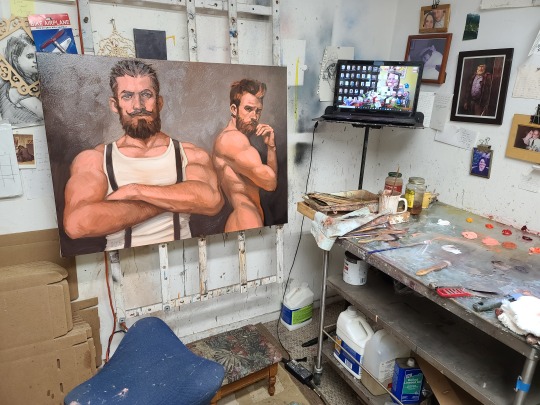
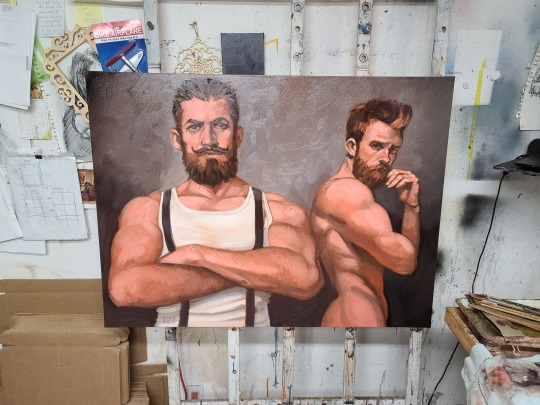

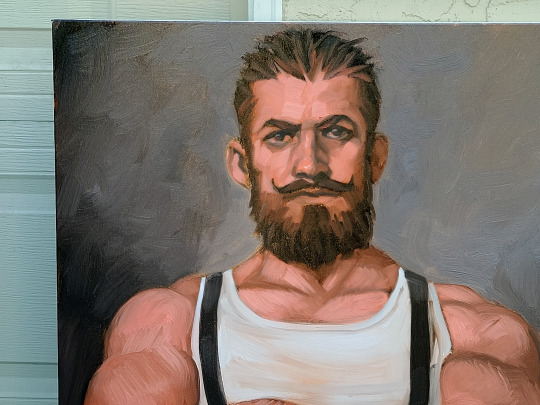
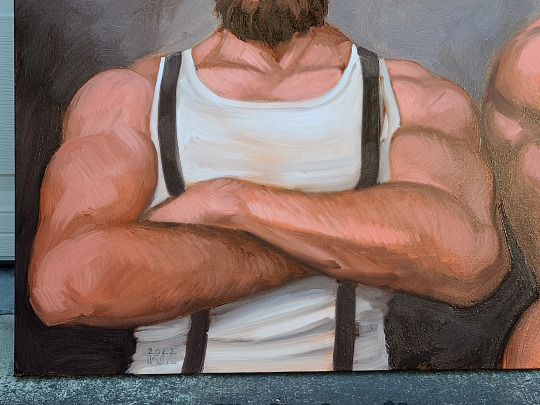
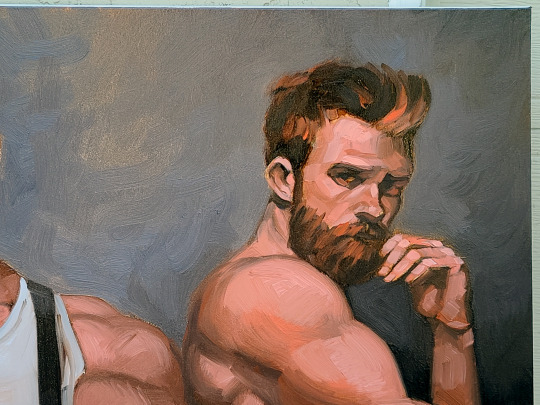
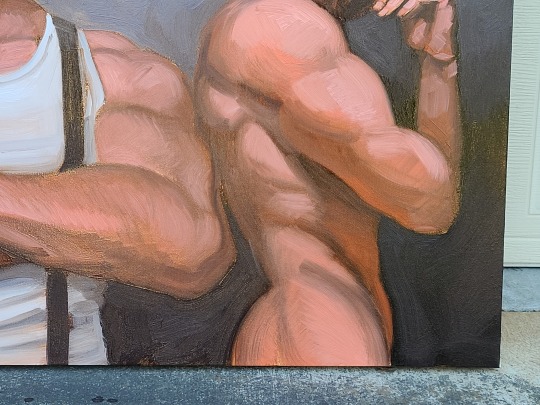
The Heart's Filthy Lesson, 30x40 inches oil on stretched canvas by Kenney Mencher This painting s on Ebay for a one day auction. Bidding starts at $3000 Auction ends Thursday 10/13/2022 https://www.ebay.com/itm/275497816427
These multiple figure paintings have been pretty popular and I feel like it’s somehow my chance to grow and improve my art into a more conceptual way. Although most of my work is about the beauty of the male figure painted as skillfully as I can, the anatomy, shading and textural qualities of the paint, I feel like I’m growing in terms of the subject matter by including more narrative or story telling elements in my art. These new paintings are meant to be a bit of a “thematic apperception test” called by shrinks the TAT. When I was in college, I learned about a psychological technique developed by American psychologist Murray at Harvard University during the 1930s. The idea for the TAT emerged from a question asked by one of Murray's undergraduate students who reported that when her son was ill, he spent the day making up stories about images in magazines and she asked Murray if pictures could be employed in a clinical setting to explore the underlying dynamics of personality. I thought this would be a great point of departure for people looking at art. I'm trying to take my subject matter a more meaningful place step beyond what I've been doing in terms of my art, where I usually paint a single beautiful or interesting looking man. In this case I was thinking of two more mature men, possibly married, in a relationship to one another. I'm attempting to tell more of a story by including multiple figures in a more complex composition. I've been working with the idea of juxtaposing a clothed figure against a nude figure and trying to tell more of a story and excite the viewers' imaginations. This time it's about two almost tough looking men, the iconography of a tank top, suspenders and a handlebar mustache against the muscular mustache twirling male in the background. I wanted to go beyond the single nude or seminude figure which at times can be pretty predictable as a format in homoerotic art. In The Heart's Filthy Lesson, I'm hoping that the body language and composition helps to tell the story. The almost split down the middle of the canvas that has the larger figure facing towards the viewer, while the other naked figure's torso is turned away but he is still looking at the viewer. I had considered having the characters' eyes looking towards one another but at the last minute I thought it might break the "third wall '' if both the characters seemed to be looking at the picture's audience. I thought it might make a stronger relationship between the viewer and the painting's story. I even imagined they were a third in ménage trois.
22 notes
·
View notes
Text
What would a historically accurate manga with the Sanson look like...Character-wise
Starting with kid!Charles since we know less of him, and thus we get more plot freedom.
Charles-Henry: (Yes, with a "Y") Instead of Shinichi Sakamoto's two-faced monstrosity, we will get another kind of special psychological case. We would have a main character who's primary strength is intelligent. From his handwritting and speech pattern, we can infer that the Mémoires were correct on some level, and that there is a change Charles-Henry went to boarding school, but also he started helping his father on the scaffold at around age 12. Both are not incompatible, since the Jesuits also educated peasants' sons and they needed to help their parents during harvest time, so yes. Just that Charles-Henry would need some good excuse when he comes back. Now, keeping a secret identity in a place were everyone calls you by name and you have very little privacy is an accomplishment. Also, boarding school syndrome, which again, is very impressive for a 10-14 year old. Oh, and even if he didn't go to formal boarding school with the other members of nobility and still be able to pass as one of them also requires a great deal of intelligence and social skills, especially considering the mental toll killing and torturing people takes on a person. Also, educational methods of the time have been proven to reduce IQ. So yeah, Charles is a smart boi ! Not a genius, but quite reasonably intelligent and socially skilled. This mixture of roguishness, brainwashed crazyness balenced with sophistication is the overall personality that is shown. Also, deep down, someone with dreams of social integration, and also arrogant. Also, Charles-Henry was notoriously bad at his job (it's surprising he lived that long in riot prone Paris), but he took it seriously, so...He stayed clumsy as an adult, so there is no reason to think he was any more agile as a tween. So, we have sophisticated, snobish, brainwashed, entitled and roguishly intelligent, with a heart beneath it all who just want acceptance and an almost lethal degree of physical clumsiness on top of being somewhat forgetful.
Charles-Jean-Baptiste: Now, Jean-Baptiste, from the Mémoires and historical accounts, if we mixt them together, we get quite the nutcase, to put it kindly. He did practice "needling" or at least ordered it, so, what a gentleman, if Derex is to be believed. Also, he had his sixteen year old daughter marry a man who was likely a stranger to her, at a time the average age of mariage was in the twenties. When a rope snaped on him during a hanging, he ended up strangling the condemned with his own hands before hanging his corpse for good measure. Also, he once illegally applied retentum, landing him is jail for a few days, so overall, that man must have had a good heart, and the Mémoires probably aren't lying describing him as kind and generous, and I would add somewhat brave. Also, it's to be noted that Jean-Baptiste's career peaked during the "affaire de l'Hôpital général" stuff, and would have been disabled when it resurfaced (stuff that surely helped him sleep). Also, all of this seems to portray a man who's proud of his position, probably wasn't too bothered by being an outcast, shamelessly enjoyed the financial benefits that came with it and might show random acts of selflessness. If we believe the Mémoires, and Charles-Henry must have learned his medical activity from someone, he was incredibly hard working (because, running a charity clinic while also having a "part time job", teaching kids how to do that future job and making a lot of the medicines yourself, that's a lot of work). His cruelty would be more systematic, not sparing his own family. Also, let's keep for plot purposes the Mémoire's devotion he has for his mother. Also, would spend a lot of time keeping Charles-Henry from "f-cking lanterns", which honestly, would have been a full-time job whenever boy isn't in boarding school. Just imagine the courage and the nerve it would take to supervise his son, at a time were the mob could very well go berserk after a botched execution, when his son is quite clumsy. Also, the Mémoirs show almost all of the Sanson as dark and moody, but also majestic, which is understandable. Dark, moody, hardworking, both generous and cruel, and a proud king of the outcasts. Also, brash, with a dark sense of humor. The mémoires have him mock a man threatening to kill him and accuse him of killing his son, and for what is more historically certain, that "finish the job manually" attitude and the illegal retentum.
Which gives a crazy father-son duo, with probably a lot of resentment on both sides. Because, I doubt Charles-Henry would not have any anger towards his father for sending him to a boarding school were he was likely bullied (even if he wasn't, sharing a bedroom with people who'll think your human trash the second they learn your name can't be good for his mental health), and have XVIIIth century equivalent of Karen ask for his expulsion, and also Jean-Baptiste would probably like it if his son was not a clumsy on the scaffold. Also, for the needs of the manga, just let's have CH accidentally damage some equipment...With this cycle:
-Jean-Baptiste rescued Charles from sticky situation he partly created
-Spanking
-Comfort
-Rinse, wash, repeat
2 notes
·
View notes
Text
The Gotham Game Sequel - The Painful One
So last week @blueskyerising asked what I had planned if I was able to head over to DC and write a Harper-led sequel to Punchline: The Gotham Game. However, I would like to adjust my answer.
The more and more we talked about Harper, and the topic of her getting brainwashed and corrupted by Punchline, the more it's grown on me.
But I want to introduce something that has been absent since the original Punchline one-shot.
Let's make the premise terrifying.
Harper, in her attempts to bring Punchline and The Royal Flush Gang, becomes infected with the nanites that The Royal Flush Gang stole and have been weaponizing. For whatever reason, Harper's tech (which was originally developed to combat Mad Hatter's nanotechnology at the time) fails, and Punchline realizes she has a new plaything.
Alexis begins exerting her control over Harper's autonomy, and has Harper admitted as a member of The Royal Flush Gang. Harper's stuck, conscious and aware, but unable to do anything but watch. During the day, Alexis has Harper act normally, going to work at Gotham City Public Works and the Thompkins Clinic, but has Harper work for Punchline at night. While this is going on, and The Royal Flush Gang gains power in Gotham, Punchline is taunting Harper. Isn't it fun? Isn't it better to stop pretending? You're just like me! I'm freeing you Harper, I'm letting you be your true self! You're not a Bluebird anymore, you're my Six of Spades! And you're doing such a great job! I love you, you're my favourite toy!
That's when things get a bit fuzzing for me, and time passes, but inevitably The Royal Flush Gang gets the Batfamily's attention. During a sting operation, Bruce, Tim, and Cass take out a Royal Flush Gang facility, stopping whatever's going on there, only to find out from Oracle that Punchline is out on the other side of town, apprehended by police.
But it's not Alexis.
It's Harper.
From there the story would shift to how I wished the Punchline backups functioned, following Harper's pre-trial. Alexis has taken her claws out of Harper for the time being, but the psychological damage remains.
Harper is deemed unfit to stand trial, and is sent to Arkham Tower.
[That's all I've got for now, there's a lot I'm still working on, and I'll probably work on the premise more in the coming weeks.]
#DC Comics#Batfamily#Bluebird#Harper Row#Batman#Bruce Wayne#Red Robin#Tim Drake#Batgirl#Cassandra Cain#Oracle#Barbara Gordon#The Royal Flush Gang#Bluff#Ace of Diamonds#Punchline#Alexis Kaye#Cullen Row#Punchline: The Gotham Game
3 notes
·
View notes